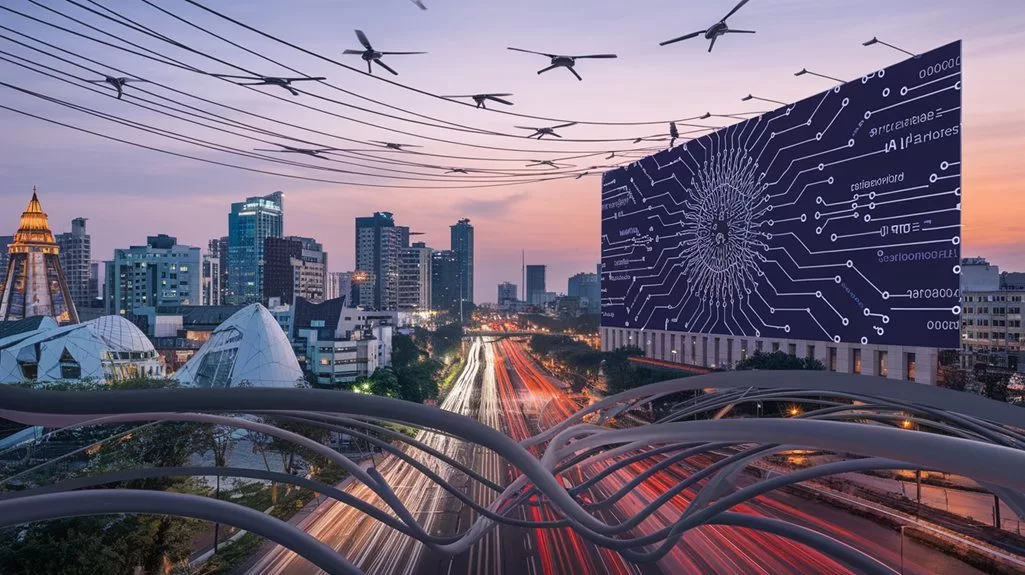AI is being controversially used to target pro-Palestinian students for deportation, sparking a storm of privacy and free speech outrage. Critics, quite predictably, slam this high-tech deportation show as invasive and rife with errors. Universities worry about funding cuts over protests, while students fear legally dodgy expulsions. National security benefits? Some tout them, others just roll their eyes. The line between safety and liberty? Blurrier than ever. Uncover what lies beneath this initiative's surface.
Key Takeaways
- AI initiative targets pro-Palestinian students, raising privacy and free speech concerns.
- Critics argue the AI infringes on First Amendment rights and individual privacy.
- Fear of deportation among students leads to reduced participation in protests.
- Legal experts question the legality and ethical implications of this AI usage.
- Public opinion is sharply divided, with civil liberties groups criticizing the measures.

While some might argue that artificial intelligence is the future of everything, its use in targeting pro-Palestinian students raises eyebrows. The Trump administration's decision to deploy AI in identifying and targeting students perceived as "pro-Hamas" for visa revocation is stirring controversy. The AI system scans social media for signs of alleged terrorist sympathies, a move some critics find troubling. They argue that this initiative, named "Catch and Revoke," infringes on free speech and privacy rights, inviting a slew of AI ethics and privacy concerns. After all, faulty AI technology could lead to embarrassing false positives. The initiative underscores the ongoing ethical struggles between safeguarding national security and upholding individual rights, with critics warning of potential misuse and overreach.
In collaboration with departments like Justice and Homeland Security, this program, overseen by Secretary of State Marco Rubio, aims to police the speech of thousands of student visa holders. These students are under scrutiny for their expressions following Hamas's October 2023 attack. Critics suggest that these measures are nothing short of draconian, threatening deportation and legal action against protesters. Universities, caught in the crossfire, risk funding cuts for allowing pro-Palestinian protests.
AI tools involved are not without their flaws. They've been criticized for harboring racist and Islamophobic biases. What a surprise. Their inability to grasp the nuances of speech raises red flags. The technology used parallels tools employed by the Israeli military for surveillance. With accuracy issues, the risk of unfair targeting looms large. Experts warn about the potential for AI misuse against various viewpoints, turning what could be a tool for good into a weapon for suppression.
AI systems, rife with biases, risk turning from tools of progress into instruments of unjust suppression.
The initiative's legal and constitutional implications are under fire. Concerns about First Amendment rights to free speech and assembly are rampant. Legal experts question the legality of deporting students for peaceful expression, arguing that everyone, regardless of immigration status, has rights to peaceful assembly. But will those rights hold up under this new AI-driven microscope? Perhaps not. Legal actions may soon follow perceived injustices in enforcement, as the line between legal and illegal becomes increasingly blurred.
Public opinion is sharply divided. Civil liberties groups and human rights organizations criticize the measures, fearing they might suppress dissent more broadly. Some, however, support the measures in the name of national security. But fear is palpable. International students report growing apprehension about participating in protests, wary of the consequences. The US State Department reportedly using AI to identify and revoke visas of foreign students seen as Hamas supporters adds another layer of complexity to the situation.
On the global stage, the use of AI for surveillance and deportation harks back to historical actions like Operation Boulder. The whole of government approach to this initiative further emphasizes the seriousness with which the administration is taking these measures. Palestinian-American voices express concern over this escalation and its broader implications. The administration's blurring of pro-Palestine and pro-Hamas sympathies only complicates matters further. As colleges face potential funding cuts, student protests are met with severe disciplinary actions, raising questions about the true cost of free speech.
References
- https://truthout.org/articles/trump-admin-reportedly-using-ai-to-label-target-visa-holders-as-pro-hamas/
- https://economictimes.com/tech/artificial-intelligence/us-to-reportedly-use-ai-to-revoke-visas-of-students-it-sees-as-hamas-supporters/articleshow/118773259.cms
- https://www.newarab.com/news/us-will-use-ai-revoke-visas-pro-palestinian-students
- https://scheerpost.com/2025/03/07/state-department-to-use-ai-to-revoke-visas-of-students-who-appear-pro-hamas/
- https://www.middleeasteye.net/trending/use-of-ai-identify-deport-students-slammed-online









